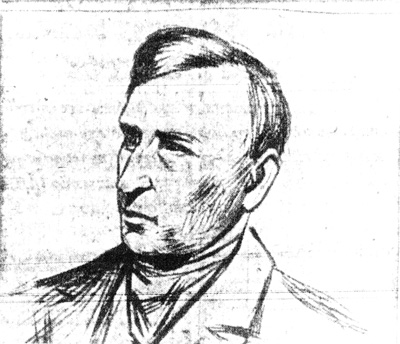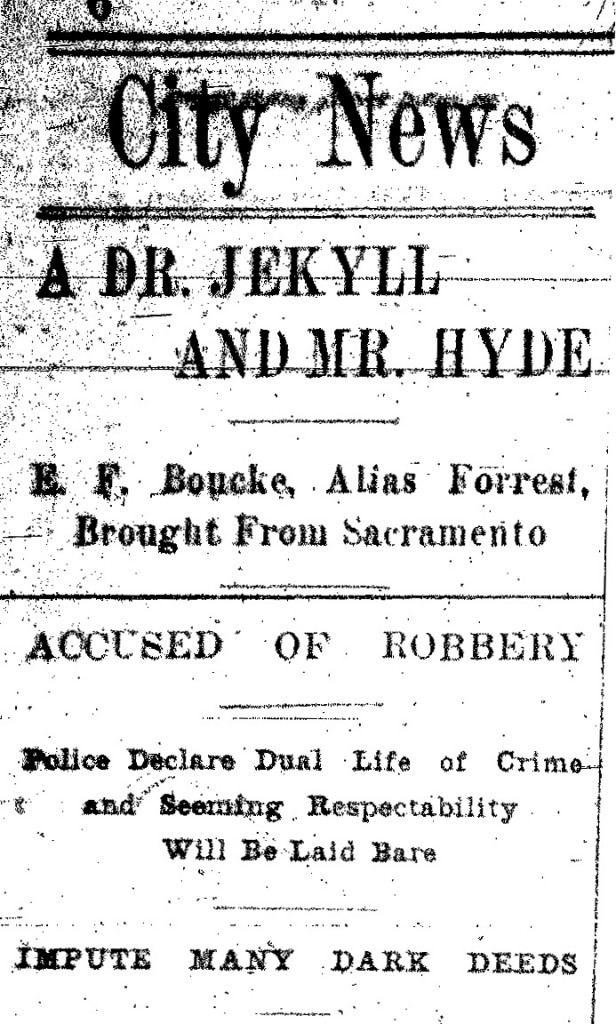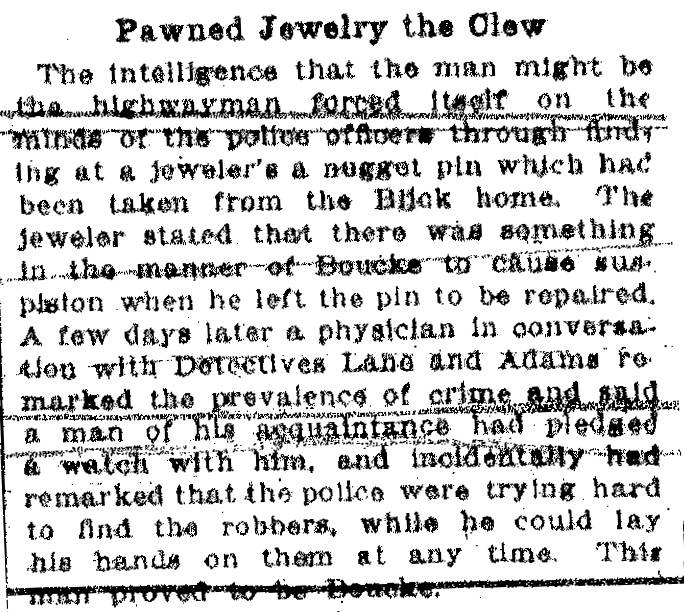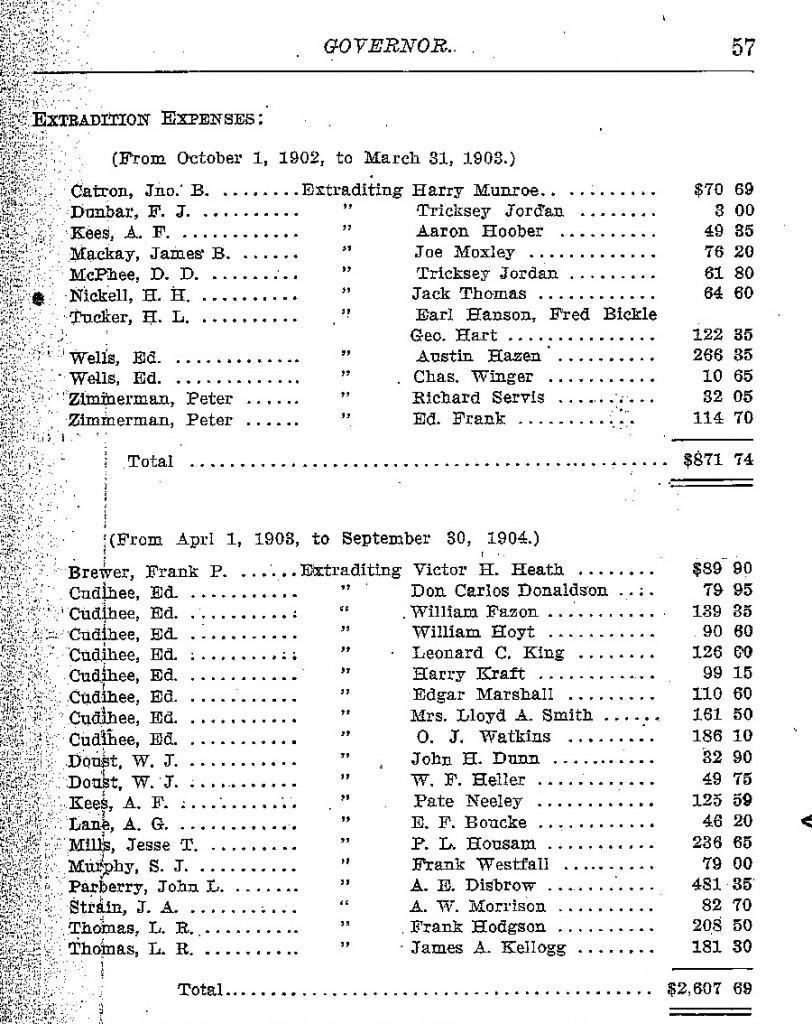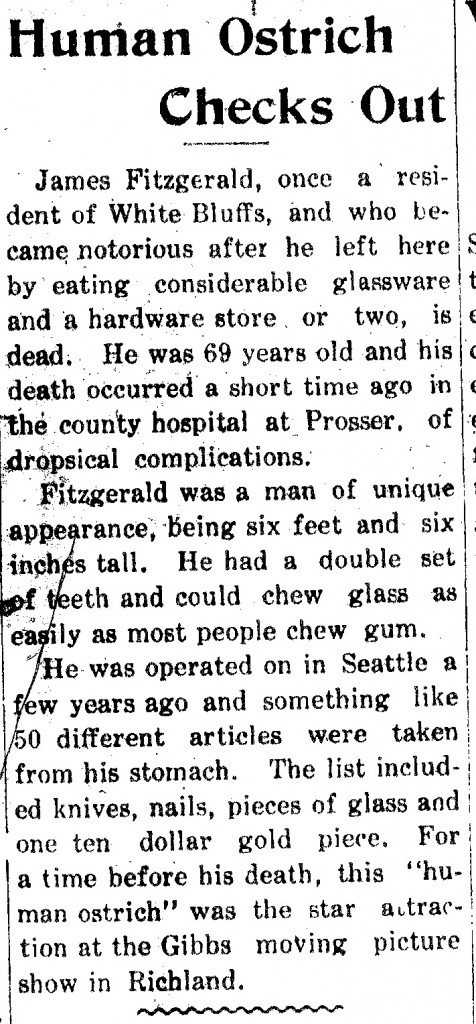From the desk of Steve Willis, Central Library Services Program Manager of the Washington State Library
By day he was a respectable insurance salesman, a churchgoing man. But by night he was one of the most dangerous criminals Seattle police had seen, performing “dark deeds of the wildest type.”
Eugene F. Boucke, born around 1865, appears to have surfaced in Seattle around 1900-1901 as a carpenter, but quickly took up the occupation of insurance salesman. His secret activity of “sallying forth at night on deeds of depredation” was revealed to the public in the following article from the Seattle Post-Intelligencer, April 12, 1903:
E.F. Boucke, Alias Forrest, Brought from Sacramento
ACCUSED OF ROBBERY
Police Declare Dual Life of Crime and Seeming Respectability Will Be Laid Bare
IMPUTE MANY DARK DEEDS
“E.F. Boucke or E. Forrest, the man the police accuse of leading a double life, one of seeming respectability and religious pretensions, and the other of crime, which startled and terrorized the community, has been brought back to this city from Sacramento, Cal., by Detective Lane of the police department, arriving yesterday morning. Boucke is charged with binding, gagging and blindfolding the Blick family at Green Lake, while he, with a companion, robbed the household of money and valuable possessions, some of which he later gave to his wife–to the woman with whom he ran away–and placed in jewelry stores and pawn shops.”
“The police regard Boucke as one of the most remarkable criminals with whom they have had to deal. They say they trace his hand in highway robberies, in such crimes as that committed in the Blick home, when the inmates were threatened with cremation in case they did not reveal the hiding place of money, and in dark deeds of the wildest type. All the while he was respected as a business man and bore the appearance rather of a minister of the gospel than of a daring criminal.”
“Finishing a series of crimes of the most extravagant nature, the police say they have evidence that Forrest, as he was known here at the time, abandoned his wife and three children, to travel under the still different name of Tennant to San Francisco in company with Lena May Molitar, a woman about whom little good is known by the detectives and police officers. The two went to Aberdeen and thence to California. In San Francisco Boucke became an insurance agent, as he had been employed by an insurance concern in this city.”
Detectives Get Wise
“By chance the detectives learned of his whereabouts after they discovered his alleged connection with the various crimes which they were investigating. The San Francisco authorities were instructed to arrest the man and word soon came that he had been taken by the police of Sacramento, where he seemed to be living with his paramour as man and wife and under the name Tennant. He admitted he had left his Seattle wife, but declared he was forced to do so through her Christian Science vagaries and his unpleasant domestic life.”
“Requisition papers were procured on the Governor of California and Detective Lane started immediately after the fugitive. He feared some trouble might be encountered there in bringing the prisoner northward, but this was done without incident. Boucke maintains that he is innocent of any crime, asserting that his change of name was due to his desire to conceal his identity and whereabouts from his wife.”
“It was to cover an alleged shortage in his accounts and also to secure money to lavish on the woman who had found favor in his eyes that Boucke was led to live his life of duplicity, say the police, appearing to the world during the day as a man of exemplary character and sallying forth at night on deeds of depredation. These officers declare they have almost positive proof of the acts which they impute to the man under arrest.”
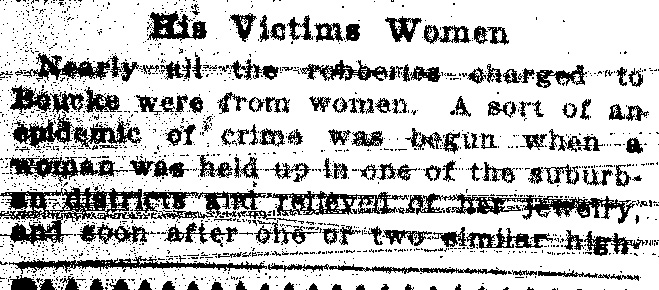 “Boucke was in the employ of an insurance company having offices in the Arcade building. He is of dignified and reserved mein and from his appearance would scarcely be termed a dangerous man.”
“Boucke was in the employ of an insurance company having offices in the Arcade building. He is of dignified and reserved mein and from his appearance would scarcely be termed a dangerous man.”
His Victims Women
“Nearly all the robberies charged to Boucke were from women. A sort of epidemic of crime was begun when a woman was held up in one of the suburban districts and relieved of her jewelry, and soon after one or two similar highway robberies were reported. Then the Moore home was entered on Thirty-second avenue and $750 worth of jewels and money was taken, while the aged Mrs. Moore and her grandson, merely a lad, were bound to their chairs and pillowslips were placed over their heads. A $30,000 shawl of ancient weave was missed by the robbers.”
“Not long after that another woman was nearly killed with fright on entering her house when two men jumped from a closet and bound and gagged her, while her valuables were stolen. Soon after that the Blick robbery occurred. In the meanwhile between these affairs there occurred a number of highway robberies and other crimes of lesser magnitude.”
“Toward the latter part of this epidemic it was suggested to the police that Boucke might have some knowledge of the operations which seemed to be connected through their similarity, but the detectives at first scoffed at the idea. They could not find that Boucke’s associates were of a bad type, and as far as could be learned his life was as it should be.”
“The intelligence that the man might be the highwayman forced itself on the minds of the police officers through finding at a jeweler’s a nugget pin which had been taken from the Blick home. The jeweler stated that there was something in the manner of Boucke to cause suspicion when he left the pin to be repaired. A few days later a physician in conversation with Detectives Lane and Adams remarked the prevalence of crime and said a man of his acquaintance had pledged a watch with him, and incidentally had remarked that the police were trying hard to find the robbers, while he could lay his hands on them at any time. This man proved to be Boucke.”
“Thus the connection was established, and almost at every turn the detectives were confronted with more evidence against the insurance agent. About that time the latter left the city, and for several weeks all clews were lost, until a letter was received by the Insurance company which said he intended to make up the deficiency in his accounts and would send the money soon. The name of Tennant was signed and an address in San Francisco was given. The letter stated that the writer was doing well there and did not wish to return to Seattle.”
“The specific charge of robbery is made against Boucke in a complaint and a preliminary examination will be held shortly. The detectives are trying hard to locate the accomplice and believe they will make an arrest or two very soon.”
According to the State Auditor’s 8th Biennial Report (1905), Washington taxpayers paid a grand total of $46.20 to transport Mr. Boucke back from Sacramento to Seattle.
On Dec. 29, 1903, Boucke was handed a 16-year sentence for robbery by King County Superior Court Judge W.R. Bell. Boucke applied for a pardon from Gov. Mead in Aug. 1905, but was turned down. The State Board of Pardons released Boucke in 1908, and after that point he vanishes from history.






